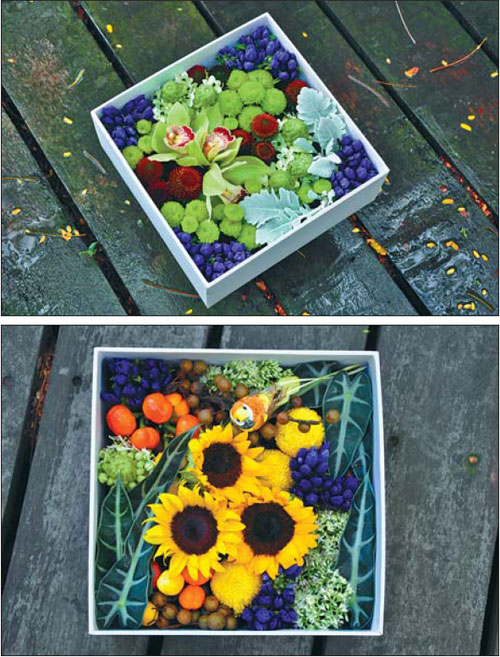 |
| Gu Yidian's flower shop, Chujian, in Guangzhou, Guangdong province, presents bouquets in which flowers form words of love. (Provided to China Daily) |
"When I see my customers happy, I'm happy," says Song Feifan, who came up with the idea of sending clowns to deliver flowers a few years ago. It has proved a great success and since his first flower shop opened in 2006, his business has developed into a chain of 16 outlets not only in the capital Beijing, but also in Hefei in Anhui province and Nanjing in Jiangsu province. He employs dozens of delivery specialists, including our happy clown, Cao.
About 70 to 80 percent of customers are lovers sending flowers to each other. Sales peak during the Valentine's Day period in February and, in recent years, also on Qixi, also known as the Chinese Valentine's Day.
Song says he received 300 to 400 orders in a single shop during Qixi.
"Women love flowers," Song says, "and they also like to be surprised."
Song is only half right, according to Gu Yidian, another flower shop owner from Guangzhou, Guangdong province. "Flowers tell stories," she says, and adds women love a well-told story more than anything else.
In order to put across the sender's good wishes, she needs to know the nuances of a bouquet and also make sure she understands the message the sender wants to put out.
"Different flowers represent different meanings. Sunflowers mean 'intense love', while calla lilies mean 'eternal love', " Gu says. "Different colors can help express different moods." And they all make up a vocabulary of love, she adds.
To add to that language, Gu not only stocks all the most common varieties locally grown, but also imports exotic flowers from the Netherlands, such as orchids, tulips and roses that are bigger, prettier and more fragrant than domestic species.
It is also important to communicate with and understand the customer well. For each order Gu receives, she says she needs to find out more about the recipient, such as favorite color, animals and shared history.
